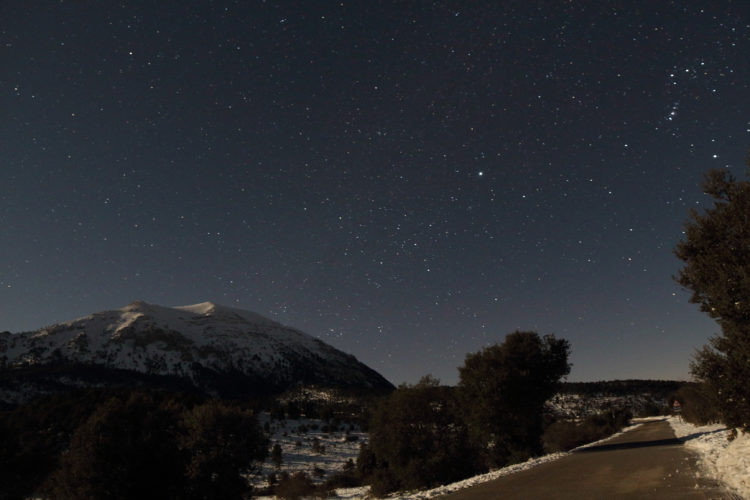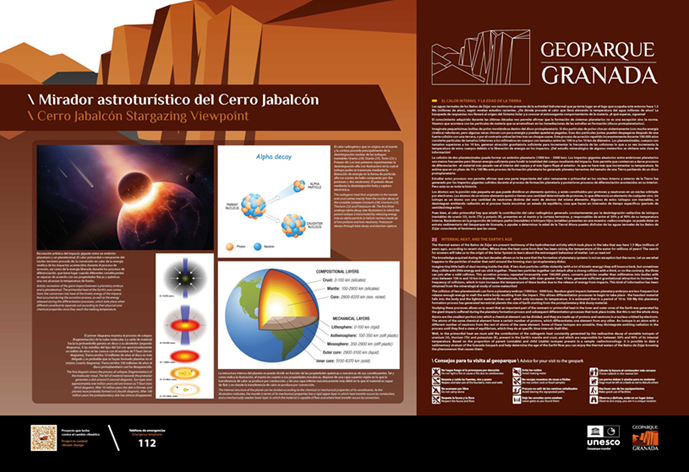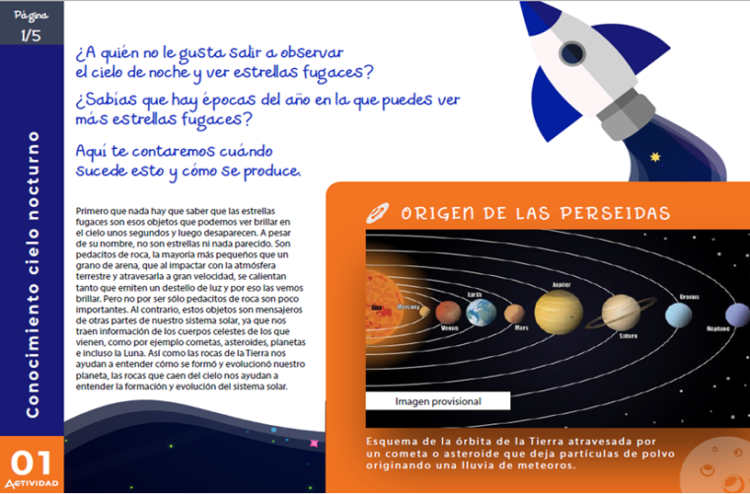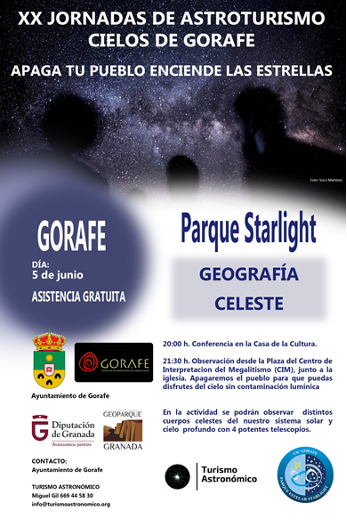Eleven percent of the sky in the Granada Geopark enjoys exceptional conditions that are difficult to find elsewhere on the Iberian Peninsula for practicing ASTROTURISM
Photo at the header of this article © Máximo Bustamante. “Milky Way over Puebla de Don Fadrique”
A study conducted by the Institute of Astrophysics of Andalusia concludes that 42% of its surface maintains conditions that would make it eligible for the highest quality certifications, and 11% possesses exceptional conditions that are difficult to find elsewhere on the Iberian Peninsula.

© Azimuth Spain
Astrotourism & Granada Geopark
Why does the Geopark of Granada have excellent potential to be an astrotourism destination?
The Geopark of Granada is a landscape of nature, culture, history, and stars. The dark night sky conditions in the area make it an exceptional place for astronomical observation, both for professionals and enthusiasts, in contrast to large cities where excessive light pollution hinders the enjoyment of this natural heritage. In fact, the province of Granada is home to a significant number of professional astronomical observatories distributed throughout different regions, such as the Sierra Nevada Professional Observatory, La Alpujarra Professional Observatory, La Sagra-Geopark de Granada Professional Observatory, and even the Institute of Astrophysics of Andalusia, which is located in our province.
For the practice of astronomical observation, the following conditions are necessary:
- A territory with extensive areas of low light pollution.
- Medium-high orography (lower atmospheric density).
- Favorable atmospheric and climatic conditions.
- High orographic shielding.
The territory of the Geopark of Granada meets these conditions, making it highly potential to become an astrotourism destination. Thanks to the extensive territory it encompasses, the dispersion of its municipalities, and the small size of most of them, there are ample areas where the dark night sky favors the practice of this activity.
How does Astronomical Tourism benefit the Geopark?
- It encourages overnight stays, prolonging the visitors’ stay in the territory.
- It attracts foreign tourism.
- These tourists usually have a medium to high purchasing power.
- This customer segment is open to enjoying innovative, different, and unique offers (provided they offer quality and excellence).
- It is a suitable tourism activity for people of all ages. It does not require demanding physical activity and can be combined with nature walks and other leisure activities.
- Astronomical and scientific tourism creates a modern destination image.
- Astronomical tourism has a very low environmental impact, generates green jobs, and helps prevent depopulation in rural areas.
- It provides unforgettable life experiences based on powerful natural and intangible resources: Nature (dark night sky and natural surroundings).
- It has important versatility and complementarity to combine different thematic activities (geology, archaeology, history, etc.), reinforcing unity and coherence throughout the territory.
Plan to transform the Geopark into an astrotourism destination:
- Study, research, and identification of successful practices in other territories.
- Participation of the Provincial Council of Granada in the European project TOURAGE, under the INTERREG IVC program. The objective was to identify good tourism practices developed in the different participating partner states of the project (Poland and Slovakia) to implement innovative and differentiating initiatives in each destination.
- Technical-scientific study aimed at obtaining a night sky quality certification, carried out by the Institute of Astrophysics of Andalusia.
- The Sky Quality Office (OCC) of the Institute of Astrophysics of Andalusia (IAA-CSIC) recently completed a study on the night sky quality of the Geopark of Granada, which began in March 2021. This work was commissioned by the Provincial Council of Granada. Thanks to this study, the Geopark has the possibility to apply for night sky quality certifications for areas that meet the requirements set by the issuing entities, thus ensuring compliance with a series of rules for protecting the sky against the threat of light pollution. The request for these quality seals is driven by the need to preserve the night sky as part of the natural heritage of this area and the associated development possibilities of astrotourism and scientific activity in the rural environment.
- Two seals will be requested:
- Starlight certification
- IDA (International Dark Sky Association) certification
For the authors of this work, Susana Martín-Ruiz, researcher at IAA-CSIC and coordinator of the study, and Máximo Bustamante Calabria, technician at IAA-CSIC, the main objective has been to obtain a comprehensive diagnosis of the sky quality in the Geopark, which serves as a reference for decision-making regarding night lighting. With this study, the OCC provides the Provincial Council of Granada and the municipalities of the Geopark with an assessment of the impact of their outdoor lighting, helping them make decisions to effectively reduce light pollution.
The work consisted of studying the light emissions from urban areas, using a methodology that combines ground brightness measurements in different filters with remote data obtained from various sources, including satellites (VIIRS, JL1, and SDGSAT-1) and photographs taken from the ISS (International Space Station). This study is one of the pioneering works in the use of images from all available satellites to date for this type of research. Thanks to the remote image calibration carried out by Alejandro Sánchez de Miguel (from the Complutense University of Madrid, a member of the OCC and co-author of this work), the light pollution sources were characterized and compared with public lighting inventories.
In addition, a geostatistical analysis was performed, and a series of sky brightness maps were created using measurements from the ground and space in different filters. The color maps provided by measuring brightness in different bands allowed for qualitative and quantitative evaluation of light pollution in the Geopark.
Indeed, between 2012 and 2021, there has been an increase in emissions: the proliferation of private infrastructure, excessive lighting at entrances to municipalities, brightly lit roundabouts, illumination of churches, facades of public buildings or monuments during nighttime hours with no traffic.
However, despite the increase in light pollution in the region, the study by the Institute of Astrophysics concludes that 42% of its surface maintains conditions that would make it eligible for the highest quality certifications, and 11% possesses exceptional conditions that are difficult to find elsewhere on the Iberian Peninsula. That is why it is crucial to reverse the growing trend of light pollution in this territory. This requires a continued focus on awareness-raising actions (points 4, 5, 6, and 7).
- Creation of a network of astronomical viewpoints in the Geopark. In coordination with the Institute of Astrophysics of Andalusia, the technical services of a specialized company have been employed to create a network of astronomical viewpoints in the Geopark. Fifteen locations have been selected to represent the best aspects of the territory in terms of geology, astronomy, tourism, heritage, and culture: La Peza, Ferreira, Fonelas, Pedro Martínez, Castilléjar, Orce, Cuevas del Campo, Zújar, Alamedilla, Dehesas de Guadix, Castril, Huéscar, Puebla de Don Fadrique, Villanueva de las Torres (with two locations in Alamedilla). The implementation of these viewpoints will begin imminently in Ferreira, Dehesas de Guadix, Castril, Zújar, and Jabalcón.

- Program for Knowledge of the Night Sky and Astronomy for Educational Centers.The purpose of this program is to awaken students’ interest in astronomy and the importance of having clean and light pollution-free skies that allow for the enjoyment of star and planet observation. Through the use of resources and simple tools, a set of activities has been implemented with the following objectives:
- Recognize the night sky as a natural, cultural, and scientific resource, learning to value it and enhance society’s connection to the night sky.
- Carry out simple practices in the family environment to promote contact with and knowledge of the night sky and its observable elements and phenomena.
- Raise awareness about light pollution.

- Advisory and Awareness Program for Municipalities.Information and awareness-raising actions are carried out targeting local administrations to make them aware of the importance of preserving the cleanliness of the night skies in the area, without emitting excessive light pollution. In collaboration with the energy office, advice is provided to municipalities regarding suitable outdoor lighting, allowing them to plan public lighting in a way that ensures safety in towns and cities while minimizing potential harm to the natural nighttime environment. This guarantees respect for nature in these privileged areas.

- Training Program for Tourism Sector Professionals:A program of training initiatives aimed at professionals in the tourism sector, with a special focus on ecotourism. The objective is to adapt the services of tourism companies in the region to meet the growing demand in the field of astronomical ecotourism, expanding and diversifying their offerings with a new business niche. The aim is to provide these professionals with basic knowledge on:
- The night sky as an economic resource
- Future vision, needs, and business niches
- Contextualization of scientific and astronomical tourism in the Geopark of Granada
- Identifying the needs of astronomical tourism users
- Service and schedule adaptations
- Innovation in the creation and offering of services
- Public awareness campaigns.
Simultaneously, efforts are underway to develop a program of knowledge and awareness targeting the general population in the Geopark territory, with the aim of strengthening the community’s connection to this valuable rural resource—a resource that is difficult to observe and enjoy in urban environments—and fostering interest in astronomy.
Through simple actions such as gathering people in a public square and switching off municipal lights, accompanied by a brief explanation about light pollution, awareness can be raised about the stark difference one experiences when gazing at a clear night sky and the repercussions of improper lighting on wildlife, health, and more.
